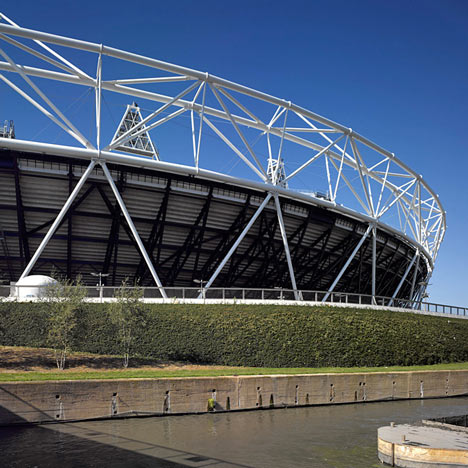
Architects of London 2012 Olympics see gagging order lifted
News: a gagging order preventing architects, engineers and builders from promoting their involvement in the London 2012 Olympics has been lifted after the UK government paid £2 million to the British Olympic Association.
The decision, announced by the chairman of the BOA, Lord Coe, and the secretary of state for culture, Maria Miller, is intended to boost Britain's economy by helping firms land contracts and deals on the back of their involvement with the games.
Dozens of companies that designed and built sports venues like the velodrome and the Olympic Stadium had previously been banned from associating themselves with the Games in their marketing materials, spurring New London Architecture chair Peter Murray to lead a protest against the ban last summer. He was joined by Angela Brady, president of the Royal Institute of British Architects, and John Nolan, president of the Institute of Structural Engineers.
The Department for Culture Media and Sport's £2 million payment to the BOA will establish a new ‘supplier recognition scheme’, allowing companies to apply for a free licence to promote their work at trade shows, apply for industry awards and promote their Olympics connections when competing for contracts.
The relaxation of the rules was a key recommendation of last summer’s report by Sir John Armitt, chairman of the Olympic Delivery Authority, on how the UK could maximise business benefits from the Games.
"I am very glad it is happening but it should have happened six months ago," said Murray in the Guardian. "The attention of the world is now on Rio and not on London. It will be a benefit to many firms, but all of the jobs for Rio have been allocated now."
RIBA president Brady also responded to the news with a statement, saying: "The majority of the architects and designers we were standing up for in the campaign were young small businesses who just wanted to be able to promote their work. It’s great that they are now able to speak freely about their contribution to the success of the 2012 Games and get the recognition they deserve."
Asked why companies had not been able to promote their association with the games in the first place, a BOA spokesman said: "These rights have a value, and it is through the sale of Olympic marketing rights that we create revenues so we can provide high-performance support to our athletes during the Olympic games."
Miller said the lifting of the gagging order meant companies could now benefit from their involvement in last year's games. "Now we have removed the barrier, companies can capitalise on the role they played at home and abroad by really selling their involvement in one of the biggest and most successful projects this country has ever put on," she said.
We reported extensively on Olympic architecture last year, from the controversial ArcelorMittal Orbit tower to the spotty PVC tents of the shooting venue – see all Olympic architecture.
Legacy plans for the Olympic Park currently include the transformation of the press building into a technology, design and research centre and the creation of up to 8000 new homes in addition to the athletes’ village.
Photograph by Edmund Sumner.